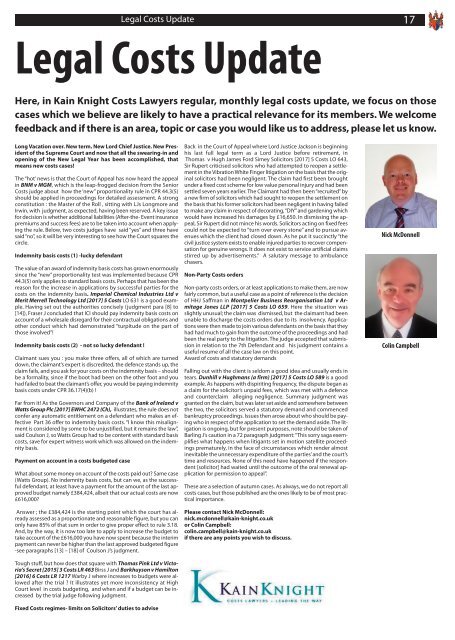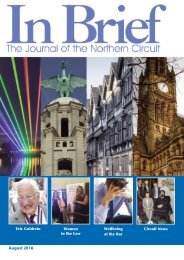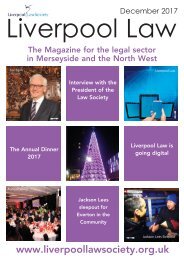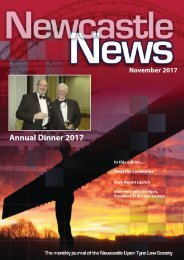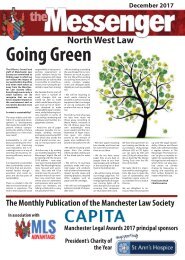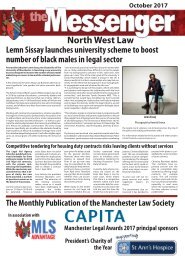Messenger November 2017
You also want an ePaper? Increase the reach of your titles
YUMPU automatically turns print PDFs into web optimized ePapers that Google loves.
Legal Costs Update 17<br />
Legal Costs Update<br />
Here, in Kain Knight Costs Lawyers regular, monthly legal costs update, we focus on those<br />
cases which we believe are likely to have a practical relevance for its members. We welcome<br />
feedback and if there is an area, topic or case you would like us to address, please let us know.<br />
Long Vacation over. New term. New Lord Chief Justice. New President<br />
of the Supreme Court and now that all the swearing-in and<br />
opening of the New Legal Year has been accomplished, that<br />
means new costs cases!<br />
The “hot’ news is that the Court of Appeal has now heard the appeal<br />
in BNM v MGM, which is the leap-frogged decision from the Senior<br />
Costs judge about how the ‘new” proportionality rule in CPR 44.3(5)<br />
should be applied in proceedings for detailed assessment. A strong<br />
constitution : the Master of the Roll , sitting with LJs Longmore and<br />
Irwin, with judgment, as expected, having been reserved. A key issue<br />
for decision is whether additional liabilities (After-the- Event insurance<br />
premiums and success fees) are to be taken into account when applying<br />
the rule. Below, two costs judges have said “yes” and three have<br />
said “no”, so it will be very interesting to see how the Court squares the<br />
circle.<br />
Indemnity basis costs (1) -lucky defendant<br />
The value of an award of indemnity basis costs has grown enormously<br />
since the “new” proportionality test was implemented because CPR<br />
44.3(5) only applies to standard basis costs. Perhaps that has been the<br />
reason for the increase in applications by successful parties for the<br />
costs on the indemnity basis. Imperial Chemical Industries Ltd v<br />
Merit Merrell Technology Ltd [<strong>2017</strong>] 5 Costs LO 631 is a good example.<br />
Having set out the authorities concisely (judgment para [8] to<br />
[14]), Fraser J concluded that ICI should pay indemnity basis costs on<br />
account of a wholesale disregard for their contractual obligations and<br />
other conduct which had demonstrated “turpitude on the part of<br />
those involved”!<br />
Indemnity basis costs (2) - not so lucky defendant !<br />
Claimant sues you : you make three offers, all of which are turned<br />
down, the claimant’s expert is discredited, the defence stands up, the<br />
claim fails, and you ask for your costs on the indemnity basis – should<br />
be a formality, since if the boot had been on the other foot and you<br />
had failed to beat the claimant’s offer, you would be paying indemnity<br />
basis costs under CPR 36.17(4)(b) !<br />
Far from it! As the Governors and Company of the Bank of Ireland v<br />
Watts Group Plc [<strong>2017</strong>] EWHC 2472 (Ch), illustrates, the rule does not<br />
confer any automatic entitlement on a defendant who makes an effective<br />
Part 36 offer to indemnity basis costs. “I know this misalignment<br />
is considered by some to be unjustified, but it remains the law”,<br />
said Coulson J, so Watts Group had to be content with standard basis<br />
costs, save for expert witness work which was allowed on the indemnity<br />
basis.<br />
Payment on account in a costs budgeted case<br />
What about some money on account of the costs paid out? Same case<br />
(Watts Group). No indemnity basis costs, but can we, as the successful<br />
defendant, at least have a payment for the amount of the last approved<br />
budget namely £384,424, albeit that our actual costs are now<br />
£616,000?<br />
Answer ; the £384,424 is the starting point which the court has already<br />
assessed as a proportionate and reasonable figure, but you can<br />
only have 85% of that sum in order to give proper effect to rule 3.18.<br />
And, by the way, it is now too late to apply to increase the budget to<br />
take account of the £616,000 you have now spent because the interim<br />
payment can never be higher than the last approved budgeted figure<br />
-see paragraphs [13] – [18] of Coulson J’s judgment.<br />
Tough stuff, but how does that square with Thomas Pink Ltd v Victoria’s<br />
Secret [2015] 3 Costs LR 463 Birss J and Barkhuyson v Hamilton<br />
[2016] 6 Costs LR 1217 Warby J where increases to budgets were allowed<br />
after the trial ? It illustrates yet more inconsistency at High<br />
Court level in costs budgeting, and when and if a budget can be increased<br />
by the trial judge following judgment.<br />
Fixed Costs regimes- limits on Solicitors’ duties to advise<br />
Back in the Court of Appeal where Lord Justice Jackson is beginning<br />
his last full legal term as a Lord Justice before retirement, in<br />
Thomas v Hugh James Ford Simey Solicitors [<strong>2017</strong>] 5 Costs LO 643,<br />
Sir Rupert criticised solicitors who had attempted to reopen a settlement<br />
in the Vibration White Finger litigation on the basis that the original<br />
solicitors had been negligent. The claim had first been brought<br />
under a fixed cost scheme for low value personal injury and had been<br />
settled seven years earlier. The Claimant had then been “recruited” by<br />
a new firm of solicitors which had sought to reopen the settlement on<br />
the basis that his former solicitors had been negligent in having failed<br />
to make any claim in respect of decorating, “DIY” and gardening which<br />
would have increased his damages by £16,650. In dismissing the appeal,<br />
Sir Rupert did not mince his words. Solicitors acting on fixed fees<br />
could not be expected to “turn over every stone” and to pursue avenues<br />
which the client had closed down. As he put it succinctly “the<br />
civil justice system exists to enable injured parties to recover compensation<br />
for genuine wrongs. It does not exist to service artificial claims<br />
stirred up by advertisements.“ A salutary message to ambulance<br />
chasers.<br />
Non-Party Costs orders<br />
Non-party costs orders, or at least applications to make them, are now<br />
fairly common, but a useful case as a point of reference is the decision<br />
of HHJ Saffman in Montpelier Business Reorganisation Ltd v Armitage<br />
Jones LLP [<strong>2017</strong>] 5 Costs LO 659. Here the situation was<br />
slightly unusual; the claim was dismissed, but the claimant had been<br />
unable to discharge the costs orders due to its insolvency. Applications<br />
were then made to join various defendants on the basis that they<br />
had had much to gain from the outcome of the proceedings and had<br />
been the real party to the litigation. The judge accepted that submission<br />
in relation to the 7th Defendant and his judgment contains a<br />
useful resume of all the case law on this point.<br />
Award of costs and statutory demands<br />
Falling out with the client is seldom a good idea and usually ends in<br />
tears. Dunhill v Hughmans (a firm) [<strong>2017</strong>] 5 Costs LO 589 is a good<br />
example. As happens with dispiriting frequency, the dispute began as<br />
a claim for the solicitor’s unpaid fees, which was met with a defence<br />
and counterclaim alleging negligence. Summary judgment was<br />
granted on the claim, but was later set aside and somewhere between<br />
the two, the solicitors served a statutory demand and commenced<br />
bankruptcy proceedings. Issues then arose about who should be paying<br />
who in respect of the application to set the demand aside. The litigation<br />
is ongoing, but for present purposes, note should be taken of<br />
Barling J’s caution in a 72 paragraph judgment: “This sorry saga exemplifies<br />
what happens when litigants set in motion satellite proceedings<br />
prematurely, in the face of circumstances which render almost<br />
inevitable the unnecessary expenditure of the parties’ and the court’s<br />
time and resources. None of this need have happened if the respondent<br />
[solicitor] had waited until the outcome of the oral renewal application<br />
for permission to appeal”.<br />
These are a selection of autumn cases. As always, we do not report all<br />
costs cases, but those published are the ones likely to be of most practical<br />
importance.<br />
Please contact Nick McDonnell:<br />
nick.mcdonnell@kain-knight.co.uk<br />
or Colin Campbell:<br />
colin.campbell@kain-knight.co.uk<br />
if there are any points you wish to discuss.<br />
Nick McDonnell<br />
Colin Campbell


